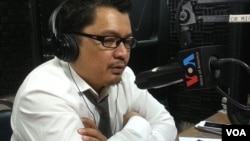A deal between the ruling party and opposition in July may have ended a yearlong political deadlock, but some rights workers now worry the compromises will not be worth the long-term costs to Cambodian democracy.
The ruling Cambodian People’s Party and the opposition Cambodia National Rescue Party have made a number of agreements, including allowing the opposition to have its own TV station, reorganizing the National Election Committee election body, and creating a minority leadership position in the parliament with rights as a “dialogue partner” with the prime minister.
But Ou Virak, chairman of the board at the Cambodian Center for Human Rights, told “Hello VOA” that the current agreement only fits the immediate needs of the situation at hand. “There is no definite guideline on how they will be implemented once the situation changes.” That’s a sign of an unhealthy democracy, he said.
“Any agreement or law must be made to fit almost every time period and circumstance, and so long as the law is not applicable at all times, it means that our democracy is not systematically solid,” he said.
The opposition says creating a minority leader position in parliament will allow them to work better with the government, a formula used in the US Congress. But Ou Virak says that is not the case and argues that the best way to strengthen a check and balance with the government is through a “shadow government” system.
“Actually, it’s this formula that is appropriate for a parliamentary democracy like Cambodia,” said Ou Virak. “It’s not the US style. It’s totally wrong to use the US formula, and it could create more problems in the process of strengthening our democracy.”
With one more television station owned by the opposition, it will add more political coverage to the existing nine stations that are already polarized on political lines. That’s not especially helpful, Ou Virak said. “If people watch CPP TV, they’ll see one thing, and once they watch CNRP TV, they’ll see another,” he said. “Therefore, we’ll see a broken Cambodia.”
The opposition defends its deals, saying it is creating a legacy for generations to come.
“What the CNRP has been striving for is not intended to serve the interests of any political party or any individual and is not designed to only address the current political situation,” Sam Rainsy said in a statement that was posted on his Facebook page. “Our intention is to lay the foundation for Cambodia’s democratic future, for other political parties and leaders who will take up their positions in the years and decades to come in the spirit of democracy. We are actually engaged in institution building and consolidation of the democratic process.”




